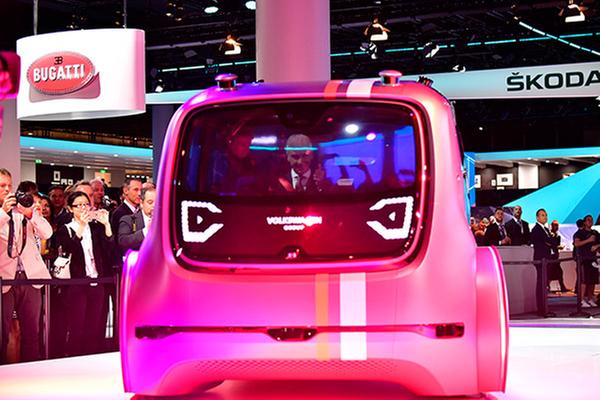Daimler warns of job cuts to support e-car program
Updated: 2017-09-14 07:51
 |
| CEO of German carmaker Volkswagen (VW) Matthias Mueller unveils Sedric, the group's first autonomous car prototype, on the eve of the IAA motor show on Monday. [Photo/Agencies] |
BERLIN-Mercedes-Benz owner Daimler AG has warned that e-cars will cut into the company's profits and cost jobs.
Electric Mercedes models will initially be just half as profitable as conventional alternatives, the German group warned, which would result in layoffs.
"In-house production is almost irrelevant to the consumer," Dieter Zetsche, chairman at Daimler, said earlier this week at the Frankfurt International Motor Show.
By 2025, Daimler has set a target of saving 4 billion euros ($4.8 billion) to help fund the cost of its electric cars.
"Daimler is the first company to state explicitly how much electric vehicles are going to hurt margins," said Bernstein analyst Max Warburton. "It was brave to go first, but of course it won't be the last."
A phase-out of combustion engines by 2030 could cost 600,000 jobs in Germany alone, the country's Ifo economic institute has warned.
Still, Mercedes-Benz will offer all its models with either electric or hybrid motors by 2022.
"We are planning for more than 50 variants of electrified vehicles," Zetsche said.
Additionally, the company's Smart car will become fully electric in Europe and the United States by 2020.
Despite these ambitious plans, it was too early to predict the end of combustion engines, Zetsche pointed out.
"Combustion engines will remain the backbone of our CO2 goals as well as our financial performance over a considerable period of time," he said.
Speaking to Xinhua, a Daimler spokesperson further noted that diesel vehicles would continue to play a "significant" role in the company's portfolio until 2025.
Daimler will roll out two new four and six-cylinder diesel motors until then.
For its part, rivals Volkswagen AG is seeking new global supplier contracts to source 50 billion euros of electric car components including batteries, which are not yet manufactured competitively in Europe.
"A company like Volkswagen must lead, not follow," said Chief Executive Officer Matthias Mueller.
The declared aim is for everyone of VW's roughly 300 models to be globally available in an electric version by 2025.
Mueller further announced that he would roll out 50 new electric vehicles and 30 new plug-in hybrids within the next eight years.
That way, one in four VW vehicles would be exclusively battery-powered by 2025, although 75 percent of its fleet will still be made up of traditional combustion engines.
Among the new electric models presented is the so-called "ID", which is designed to compete with the Tesla Model 3, the least expensive car offered by the US electric car maker.
According to Mueller, the auto industry is undergoing an irreversible process of transformation. VW was taking up the challenge by developing new capacities to manufacture battery cells at its Salzgitter factory.
A battery capacity of at least 150 gigawatt hours per year will be required to power the electric fleet, which the company intends to assemble by 2025.
XINHUA-REUTERS
























